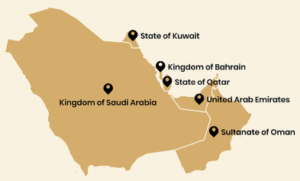In today’s global economy, Intellectual Property (IP) is not just a legal concept—it is a strategic tool for economic development, competitive advantage, and innovation.
This is especially true for emerging markets and the Gulf Cooperation Council (GCC) countries, where IP is increasingly being recognized as a catalyst for transitioning from resource-based to knowledge-based economies.
IP in Emerging Markets: Unlocking Potential
Emerging markets often possess a rich base of talent, creativity, and entrepreneurship. However, without strong IP frameworks, much of this innovation goes unprotected, limiting its commercial viability and deterring investment. Effective IP systems incentivize inventors and businesses to invest in research and development (R&D), knowing that their creations can be legally protected and monetized—a principle supported by organizations like the OECD, which highlights the value of IP in driving licensing, financing, and growth.
A robust IP regime enables small and medium-sized enterprises (SMEs) and startups to secure competitive advantages, attract funding, and enter global markets. At the same time, clear and enforceable IP laws provide confidence to foreign investors and multinational companies seeking to transfer technology or establish partnerships in these regions.
However, many emerging markets face challenges such as inadequate IP infrastructure, limited public awareness, and judicial bottlenecks. These barriers can lead to weak enforcement of IP rights and rampant counterfeiting, both of which hinder innovation. Addressing these gaps through policy reform, capacity-building, and education is essential to unlocking the full potential of IP in these economies.
GCC Innovation Strategies: IP as a Cornerstone

The GCC countries—Saudi Arabia, the United Arab Emirates, Qatar, Kuwait, Bahrain, and Oman—are pursuing ambitious national visions that aim to diversify their economies and reduce dependence on oil revenues. Central to these strategies is the development of knowledge-based sectors, including advanced manufacturing, renewable energy, life sciences, artificial intelligence, and financial technology.
In this context, IP protection has become a strategic imperative. GCC governments have invested heavily in modernizing IP legislation, digitalizing patent and trademark filing systems, and enhancing the capacity of IP offices. For example, Saudi Arabia’s Intellectual Property Authority (SAIP) and the UAE’s Ministry of Economy have been actively promoting IP awareness, joining global treaties, and aligning local laws with World Intellectual Property Organization (WIPO) standards.
Initiatives like Saudi Vision 2030 and the UAE’s National Innovation Strategy underscore the role of IP in driving innovation ecosystems. According to PwC, the GCC has seen a 25% surge in patent grants since 2015, with PCT filings growing at a 20% compound annual growth rate (CAGR) in Saudi Arabia and 41% in the UAE between 2015–2022. These programs support startups and innovators through incubators, funding platforms, and international collaborations, all underpinned by strong IP rights that secure the value of intangible assets.
The Strategic Value of IP in Innovation
In both emerging markets and the GCC, IP goes beyond legal protection—it is integral to national competitiveness. For governments, it is a policy lever for attracting foreign direct investment, encouraging R&D, and fostering technology transfer—strategies supported by research such as the OECD’s study on valuation and exploitation of intellectual property. For businesses, it is a critical asset that underlies brand value, technological leadership, and market entry strategies.
At Azami, we’ve seen firsthand how digital-first IP solutions like agent selection engines or centralized foreign filing systems can accelerate regional innovation ecosystems. These technologies not only improve operational efficiency but also empower stakeholders to make data-driven decisions that increase IP impact across borders.
As innovation becomes increasingly global, IP also serves as a tool for international cooperation. GCC countries are increasingly filing patents and trademarks in jurisdictions such as the United States, Europe, and China, reflecting a more outward-looking innovation agenda. Similarly, cross-border licensing and collaborative R&D projects are becoming more common, facilitated by strong IP protection.
Looking Ahead: Building Resilient IP Ecosystems
To sustain progress, both emerging markets and GCC countries must continue strengthening their IP ecosystems. This includes training IP professionals, improving enforcement mechanisms, reducing the time and cost of IP registration, and fostering a culture of innovation through education and public-private partnerships.
Furthermore, as digital technologies evolve rapidly, legal systems must adapt to new forms of IP such as software algorithms, data rights, and digital content. Addressing these complexities will require regional collaboration, harmonization of standards, and proactive policy development.
Ultimately, intellectual property is not just a legal safeguard—it is a driver of innovation, entrepreneurship, and economic resilience. By integrating IP into national innovation strategies, emerging markets and GCC countries can position themselves at the forefront of global innovation, unlocking new opportunities for sustainable growth and societal advancement.
If you want to know how tech-enabled IP solutions can help support you in these or other regions, reach out to us.



